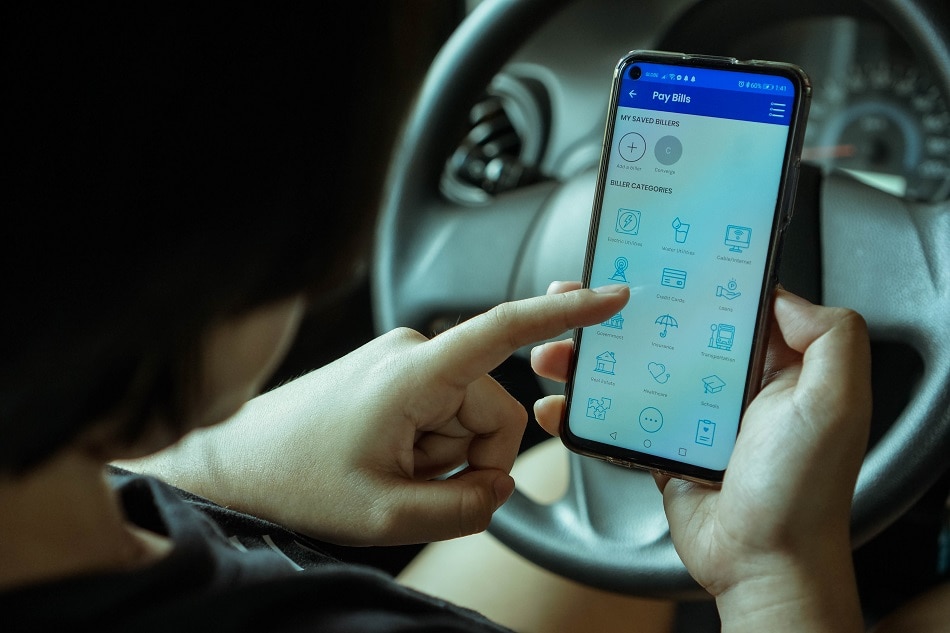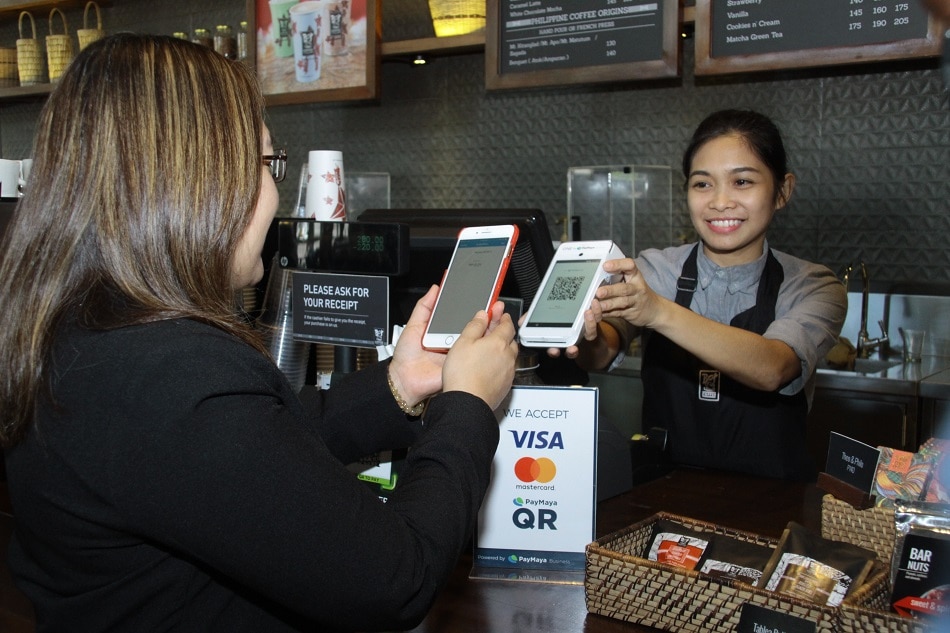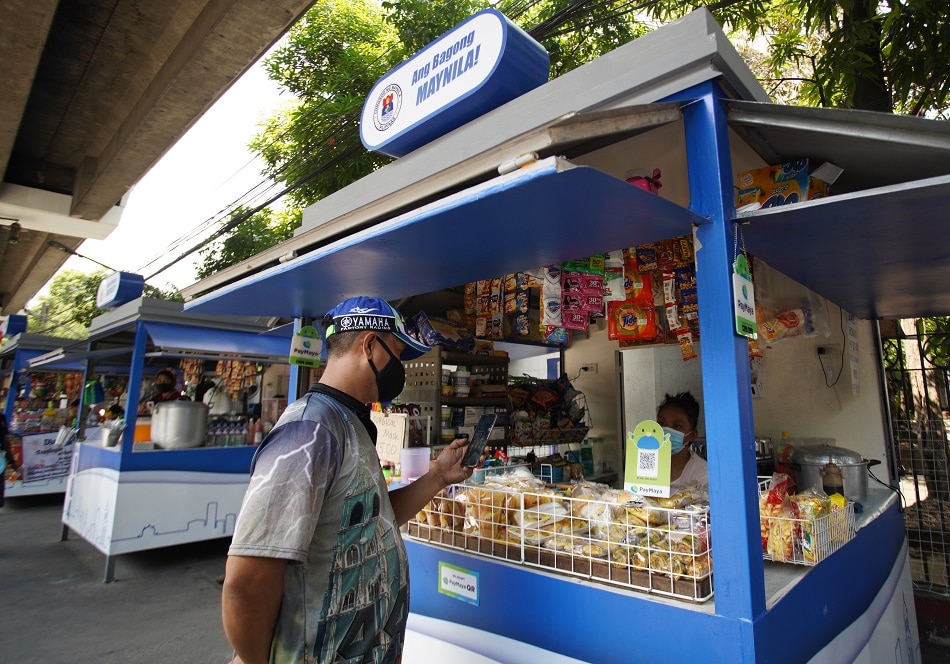'Cashless' is king? Pandemic gives rise to 'e-numan,' virtual communities | ABS-CBN
ADVERTISEMENT

Welcome, Kapamilya! We use cookies to improve your browsing experience. Continuing to use this site means you agree to our use of cookies. Tell me more!
'Cashless' is king? Pandemic gives rise to 'e-numan,' virtual communities
'Cashless' is king? Pandemic gives rise to 'e-numan,' virtual communities
Liza Reyes and Jessica Fenol,
ABS-CBN News
Published Jul 26, 2020 09:36 PM PHT
|
Updated Jul 26, 2020 11:02 PM PHT
MANILA – It's 9 a.m. and Ivy is getting ready to go to work – in their living room.
MANILA – It's 9 a.m. and Ivy is getting ready to go to work – in their living room.
Ivy, who works at a multinational bank’s shared services department, has been forced by the pandemic to work from home indefinitely.
Ivy, who works at a multinational bank’s shared services department, has been forced by the pandemic to work from home indefinitely.
But it’s not just her work environment that was affected by the COVID-19 crisis – her lifestyle also changed. She found herself doing more online shopping and other transactions.
But it’s not just her work environment that was affected by the COVID-19 crisis – her lifestyle also changed. She found herself doing more online shopping and other transactions.
“I wasn’t a fan of online shopping apps before but with the new normal, I’ve discovered how cheaper online shopping could be. I’ve thoroughly used my mobile banking apps for online purchases,” she said.
“I wasn’t a fan of online shopping apps before but with the new normal, I’ve discovered how cheaper online shopping could be. I’ve thoroughly used my mobile banking apps for online purchases,” she said.
ADVERTISEMENT
The coronavirus pandemic has rapidly increased virtual transactions and cashless purchases, changing lifestyles and the retail landscape.
The coronavirus pandemic has rapidly increased virtual transactions and cashless purchases, changing lifestyles and the retail landscape.
GCash, a mobile wallet service provider, said it noticed 4 key trends emerging from the lockdowns.
GCash, a mobile wallet service provider, said it noticed 4 key trends emerging from the lockdowns.
With most household members forced to stay at home, online transactions grew significantly.
With most household members forced to stay at home, online transactions grew significantly.
“Because of the lockdown, it suspended movement and therefore there’s a shift to online… in conducting errands, doing business. We saw an increased adoption of (buying) grocery items and food deliveries online,” Martha Sazon, president and CEO of GCash, told ABS-CBN News.
“Because of the lockdown, it suspended movement and therefore there’s a shift to online… in conducting errands, doing business. We saw an increased adoption of (buying) grocery items and food deliveries online,” Martha Sazon, president and CEO of GCash, told ABS-CBN News.
More consumers embraced digital practices, which meant setting aside “physical cash” in favor of mobile wallets.
More consumers embraced digital practices, which meant setting aside “physical cash” in favor of mobile wallets.
ADVERTISEMENT
“People are afraid to handle cash now. Kasi nga for safety reasons. Cash is physical, ‘ipinasa-pasa’ (passed around),” Sazon said.
“People are afraid to handle cash now. Kasi nga for safety reasons. Cash is physical, ‘ipinasa-pasa’ (passed around),” Sazon said.
Home entertainment also got a boost, added Sazon, as they saw a rise in time and money spent on watching videos at home.
Home entertainment also got a boost, added Sazon, as they saw a rise in time and money spent on watching videos at home.
“The way people have been coping at home...one is getting themselves entertained watching for entertainment, the other is watching video to build new skills like baking. GCash is used to buy gaming credits, buying apps for whatever weapon or skills at Google playstore or appstore, even buying internet data plans,” she said.
“The way people have been coping at home...one is getting themselves entertained watching for entertainment, the other is watching video to build new skills like baking. GCash is used to buy gaming credits, buying apps for whatever weapon or skills at Google playstore or appstore, even buying internet data plans,” she said.
Metro Manila experienced one of the longest lockdowns in the world amid the coronavirus pandemic, restricting movement and forcing business closures and job losses.
E-NUMAN AND OTHER ONLINE GROUP ACTIVITIES
Metro Manila experienced one of the longest lockdowns in the world amid the coronavirus pandemic, restricting movement and forcing business closures and job losses.
E-NUMAN AND OTHER ONLINE GROUP ACTIVITIES
But despite these challenges, Filipinos found solace in each other.
But despite these challenges, Filipinos found solace in each other.
ADVERTISEMENT
“Filipinos are very social in nature, ‘yung’ contact, whether virtual or physical, with another person is very important and that’s how we’re coping with the troubles we face. Group activities have been moved to online. Online groups, reunions, masses, video chat, birthdays, weekend gatherings — e-numan,” Sazon said.
“Filipinos are very social in nature, ‘yung’ contact, whether virtual or physical, with another person is very important and that’s how we’re coping with the troubles we face. Group activities have been moved to online. Online groups, reunions, masses, video chat, birthdays, weekend gatherings — e-numan,” Sazon said.
GCash said transactions spiked 700 percent in May as Filipinos turned to e-commerce during the coronavirus lockdown. Customers loaded their GCash wallets using Instapay and paid for purchases on Google, Apple and Lazada more than they did during the same month in 2019.
GCash said transactions spiked 700 percent in May as Filipinos turned to e-commerce during the coronavirus lockdown. Customers loaded their GCash wallets using Instapay and paid for purchases on Google, Apple and Lazada more than they did during the same month in 2019.
Online selling communities proliferated even more as “physical stores” were absent during the lockdowns. Many brick-and-mortar businesses slumped, forcing some companies to let go of employees.
Online selling communities proliferated even more as “physical stores” were absent during the lockdowns. Many brick-and-mortar businesses slumped, forcing some companies to let go of employees.
Navigating through these financial volatilities led to another trend, as many resorted to learn how to preserve wealth during these trying times.
Navigating through these financial volatilities led to another trend, as many resorted to learn how to preserve wealth during these trying times.
“Iniisip ng mga tao palagi, kung may pera ako, paano ko ma-pe-preserve wealth ko or how can I continue to grow it kahit maliit lang?”
“Iniisip ng mga tao palagi, kung may pera ako, paano ko ma-pe-preserve wealth ko or how can I continue to grow it kahit maliit lang?”
ADVERTISEMENT
(Nowadays, people often think, if I have some money how will I preserve or make this grow?)
(Nowadays, people often think, if I have some money how will I preserve or make this grow?)
GCash is offering consumers an easier way to save money--without having to go to the bank. Its GSave feature enables users to create and open a digital savings account on their mobile phones at an interest rate of 3.1 percent.
GCash is offering consumers an easier way to save money--without having to go to the bank. Its GSave feature enables users to create and open a digital savings account on their mobile phones at an interest rate of 3.1 percent.
“It’s actually democratizing financial services. The traditional mindset of people is financial services are for the rich… With this, we make it easy, available and accessible for more people. And we noticed it’s the younger generation who are more concerned on the impact of the virus on their financial security,” said Sazon.
“It’s actually democratizing financial services. The traditional mindset of people is financial services are for the rich… With this, we make it easy, available and accessible for more people. And we noticed it’s the younger generation who are more concerned on the impact of the virus on their financial security,” said Sazon.
From savings to disbursement, GCash was also tapped by the Department of Social Welfare and Development (DSWD) for the disbursement of P16 billion in financial aid to over 2.4 million beneficiaries in seven regions in the country.
From savings to disbursement, GCash was also tapped by the Department of Social Welfare and Development (DSWD) for the disbursement of P16 billion in financial aid to over 2.4 million beneficiaries in seven regions in the country.
ECQ BOOSTS E-TRANSACTIONS
PayMaya, for its part, said more Filipinos embraced digital transactions during the coronavirus lockdown out of “necessity.” They now have “increasing preference” for contactless and cashless payments, as restrictions and fear of COVID-19 contagion persist.
During the enhanced community quarantine (ECQ) imposed starting mid-March in the entire island of Luzon, sending money through PayMaya became one of the most popular services, PayMaya president Shailesh Baidwan told ABS-CBN News, without disclosing figures.
“Prior to the COVID-19 pandemic, a reason why Filipinos were not yet into digital payments transactions before was because they didn't have to. With the transition towards general ECQ and the new normal, people are now adopting digital payments technologies faster not just out of necessity but also as default preference,” Baidwan said.
PayMaya, for its part, said more Filipinos embraced digital transactions during the coronavirus lockdown out of “necessity.” They now have “increasing preference” for contactless and cashless payments, as restrictions and fear of COVID-19 contagion persist.
During the enhanced community quarantine (ECQ) imposed starting mid-March in the entire island of Luzon, sending money through PayMaya became one of the most popular services, PayMaya president Shailesh Baidwan told ABS-CBN News, without disclosing figures.
“Prior to the COVID-19 pandemic, a reason why Filipinos were not yet into digital payments transactions before was because they didn't have to. With the transition towards general ECQ and the new normal, people are now adopting digital payments technologies faster not just out of necessity but also as default preference,” Baidwan said.
ADVERTISEMENT
Money transfers to PayMaya, Smart Padala agents or to another bank account surged, followed by purchase of airtime load to help consumers stay connected digitally through social media and messaging apps, PayMaya said.
The app was also used to purchase or pay video streaming subscriptions such as Netflix.
PLDT head of communications Ramon Isberto earlier said Filipinos who were working from home adapted to the new normal by allotting time for home entertainment and socializing. This fueled demand for smooth internet connectivity, video streaming platforms, and cashless payment means.
Money transfers to PayMaya, Smart Padala agents or to another bank account surged, followed by purchase of airtime load to help consumers stay connected digitally through social media and messaging apps, PayMaya said.
The app was also used to purchase or pay video streaming subscriptions such as Netflix.
PLDT head of communications Ramon Isberto earlier said Filipinos who were working from home adapted to the new normal by allotting time for home entertainment and socializing. This fueled demand for smooth internet connectivity, video streaming platforms, and cashless payment means.
Businesses shifting to digital in order to thrive in the “new normal” also pushed the demand for cashless transactions, Baidwan said. Firms have to “pivot quickly” to keep up with the changing behavior of consumers who now prefer to order food, essentials and even retail items online.
Companies such as Lazada, Grab, Zalora, and Carousell started offering essentials and food items while big conglomerates, including the SM and Gokongwei groups, ramped up their digital offerings, which in turn all need cashless means for payments.
“In the past three months, we have seen a lot of amazing and innovative ways that our partners have used our solutions to pivot or adapt to the current situation–whether it's offering digital payments via teleconsultation, receiving donations through their e-commerce stores, or instantly disbursing financial assistance to constituents in the case of some LGUs,” he added.
Since more first-time users have acquainted themselves with the convenience of online payments, Baidwan said he expected more new registrations, downloads and transactions in the coming months.
“People will only get more comfortable and confident about using e-wallets. From being a necessity, cashless will be the default,” he said.
PayMaya also caters to those who are have not fully migrated to digital with its more than 30,000 Smart Padala agents in remote areas, it said.
The platform was also tapped by the government to distribute some P1.4 billion cash aid to displaced small business workers, single moms, scholars and senior citizens. More will be disbursed for the DSWD’s second tranche of the Social Amelioration Program, it said.
“Intrinsically, mobile wallets are democratic and inclusive by nature. Through the PayMaya app, even those living in far-flung areas outside the reach of the traditional banking network can transact online,” Baidwan said.
PayMaya said it has the capacity and infrastructure to cater to the demand. It launched self-service channels for troubleshooting, automated processes for faster verification, and PayMaya Negosyo app for QR code application, among others, it said.
“With what we are seeing today, it is reasonable to conclude that more and more Filipinos are not just becoming aware, but even becoming very savvy about doing financial transactions through digital means,” Baidwan said.
Businesses shifting to digital in order to thrive in the “new normal” also pushed the demand for cashless transactions, Baidwan said. Firms have to “pivot quickly” to keep up with the changing behavior of consumers who now prefer to order food, essentials and even retail items online.
Companies such as Lazada, Grab, Zalora, and Carousell started offering essentials and food items while big conglomerates, including the SM and Gokongwei groups, ramped up their digital offerings, which in turn all need cashless means for payments.
“In the past three months, we have seen a lot of amazing and innovative ways that our partners have used our solutions to pivot or adapt to the current situation–whether it's offering digital payments via teleconsultation, receiving donations through their e-commerce stores, or instantly disbursing financial assistance to constituents in the case of some LGUs,” he added.
Since more first-time users have acquainted themselves with the convenience of online payments, Baidwan said he expected more new registrations, downloads and transactions in the coming months.
“People will only get more comfortable and confident about using e-wallets. From being a necessity, cashless will be the default,” he said.
PayMaya also caters to those who are have not fully migrated to digital with its more than 30,000 Smart Padala agents in remote areas, it said.
The platform was also tapped by the government to distribute some P1.4 billion cash aid to displaced small business workers, single moms, scholars and senior citizens. More will be disbursed for the DSWD’s second tranche of the Social Amelioration Program, it said.
“Intrinsically, mobile wallets are democratic and inclusive by nature. Through the PayMaya app, even those living in far-flung areas outside the reach of the traditional banking network can transact online,” Baidwan said.
PayMaya said it has the capacity and infrastructure to cater to the demand. It launched self-service channels for troubleshooting, automated processes for faster verification, and PayMaya Negosyo app for QR code application, among others, it said.
“With what we are seeing today, it is reasonable to conclude that more and more Filipinos are not just becoming aware, but even becoming very savvy about doing financial transactions through digital means,” Baidwan said.
Bangko Sentral ng Pilipinas Governor Benjamin Diokno earlier said the pandemic "highlighted" the need for digital transactions.
Bangko Sentral ng Pilipinas Governor Benjamin Diokno earlier said the pandemic "highlighted" the need for digital transactions.
Read More:
Digital transactions
cashless
contactless payments
GCash
PayMaya
mobile wallet
coronavirus pandemic impact
ADVERTISEMENT
ADVERTISEMENT







